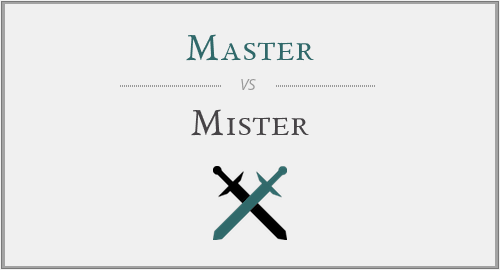Master and mister are two different words that can often be confusing due to their similar looking spellings and multiple meanings of each word. However, the one similarity between them is that in English language, they are both titles used to refer to the male gender. Now the question remains, if they refer to same thing, what is the difference between the two words?
With the help of this article, I will illustrate the difference between the two words, highlighting their contextual meanings. At end, I would explain a useful trick to help you utilize them accurately in your writing instantly.
Origin:
Old English mæg(i)ster (later reinforced by Old French maistre ), from Latin magister ; probably related to magis ‘more’. The word mister originated from mid-16th century: weakened form of master1 in unstressed use before a name.
Master as noun:
Master is used as a noun which means a man who has people working for him, especially servants or slaves.
He acceded to his master's wishes.
Master also refers to a skilled practitioner of a particular art or activity.
I'm a master of disguise.
Master and mister also differentiate on age basis as master is utilized to refer to a male who is under 18 and as soon as he reaches that age and enters the practical life, he is referred to as mister.
“Master Richard, your mother requests your presence in her chambers immediately.” The servant informed the teenage boy.
Master as adjective:
The word master is also be used as an adjective where the meaning of it changes and refers to possessing and displaying excellent expertise in one particular field.
You don't have to be a master chef in order to cook meat properly.
Master as verb:
Master is also a verb that means to attain complete experience and understanding of a particular thing that can be a skill or academic subject etc.
I never mastered Latin.
To gain control of or overcome something is also termed as master.
He managed to master his fears.
Mister as noun:
Mister is used as a noun in English language to refer to the male gender in a formal way. A common abbreviation of the word ‘Mr.’ is usually utilized in today’s world.
“Mister Lincoln, you are brought here as a witness to the crime.”
Mister has another meaning that is used to refer to appliances, like a bottle, that has a nozzle at one end to spray the liquid inside.
Every day I water my house plants with the mister.
Examples:
We are the masters of our own destinies.
It is impossible to master any language in a month.
He mastered the art of deception in early childhood.
Rogers is a master mechanic and a brilliant businessman, that is why his customers are loyal to him.
Mister Joseph asked me to escort you to the dining hall.
The brilliant director, Mister Nolan, will be the guest of honor of today’s event.
The slave begged his master for water but he was refused and beaten to death.
Master or mister:
Learning these titles and designations are hard for people who speak English as second language. So, to remember mister is for adults and master for under the legal age males. As master and monarch both start with ‘m’, you can remember that master is used for adult males in power just like our history.









Have a discussion about this article with the community:
Report Comment
We're doing our best to make sure our content is useful, accurate and safe.
If by any chance you spot an inappropriate comment while navigating through our website please use this form to let us know, and we'll take care of it shortly.
Attachment
You need to be logged in to favorite.
Log In